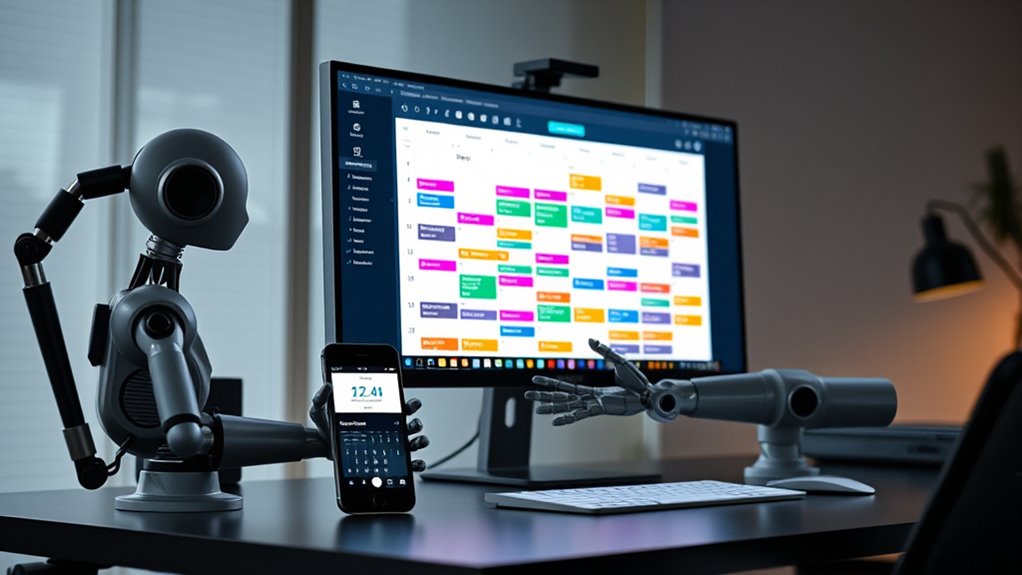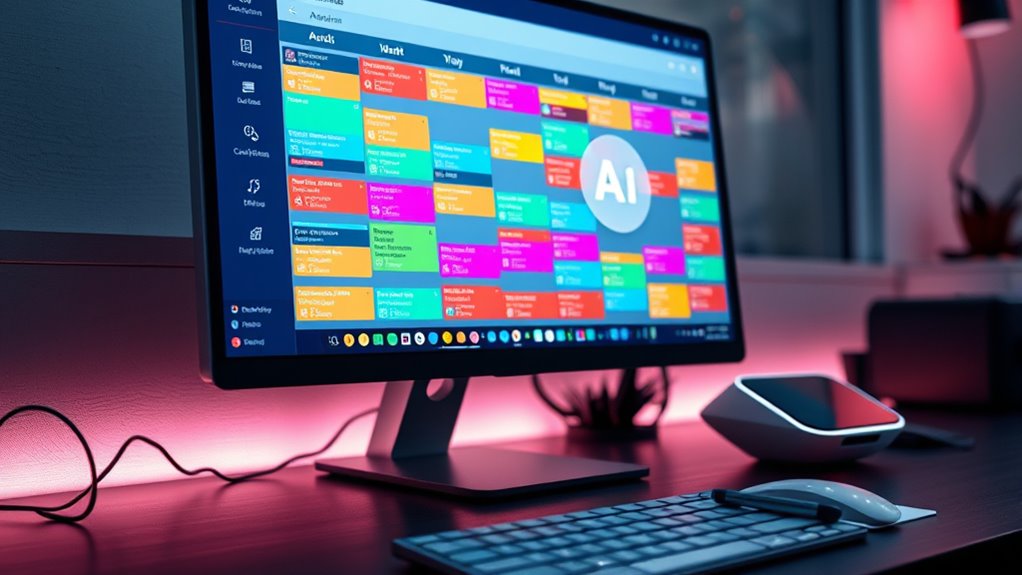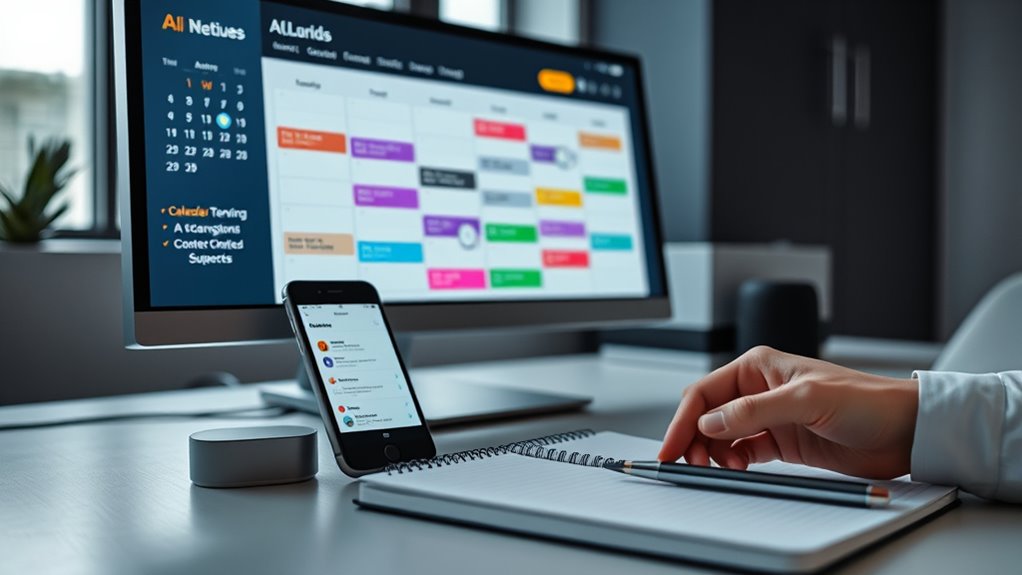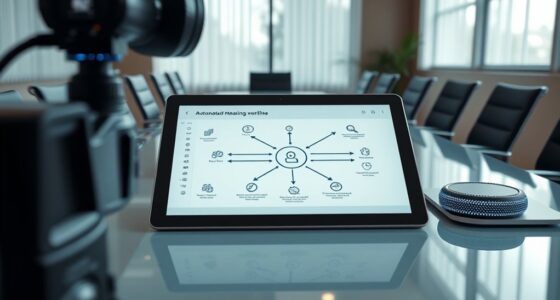AI assistants make scheduling easier by automating tasks like finding available times, managing conflicts, and adjusting for different time zones. They sync with your calendar apps, detect overlaps, and suggest alternative slots, saving you time and reducing errors. By integrating seamlessly with platforms like Google Calendar or Outlook, they keep everything updated across devices. Continue exploring to discover how these tools can optimize your calendar management even further.
Key Takeaways
- AI assistants automate scheduling tasks by handling time zone differences, conflicts, and suggesting optimal meeting times.
- They seamlessly integrate with platforms like Google Calendar, Outlook, and Apple Calendar for real-time updates.
- Automated conflict detection and resolution optimize calendar management, reducing manual adjustments and errors.
- Customization options allow users to set preferences, notifications, and privacy settings for tailored scheduling.
- Future trends focus on smarter, anticipatory AI that predicts scheduling needs and automates adjustments proactively.
How AI Assistants Simplify Scheduling Tasks

AI assistants make scheduling tasks much easier by handling the details for you. They automatically manage time zone adjustments, so your meetings are accurately scheduled across different regions without manual calculations. This guarantees everyone is on the same page, no matter where they’re located. When conflicts arise, AI assistants quickly identify overlapping appointments and suggest alternative times, streamlining meeting conflict resolution. You don’t have to spend time manually checking calendars or sending multiple emails to find a suitable slot. Instead, the AI takes care of these complexities in real-time, saving you hours and reducing errors. Additionally, understanding the importance of emotional readiness can help ensure that scheduling personal or sensitive meetings is approached thoughtfully. By automating these tedious tasks, AI assistants allow you to focus on more important work, making your scheduling process more efficient and stress-free.
Key Features of AI-Powered Calendar Tools

One of the most important aspects of AI-powered calendar tools is their ability to seamlessly integrate with your existing apps and platforms. This integration ensures smooth data flow and reduces manual input, saving you time. A key feature is conflict resolution, where the AI detects scheduling overlaps and suggests ideal adjustments automatically. This minimizes clashes and keeps your day running smoothly. User customization is another essential feature, allowing you to tailor settings, notifications, and preferences to fit your workflow. You can prioritize certain meetings, set availability, and define preferences for reminders. These features work together to create a personalized, efficient scheduling experience, enabling you to manage your calendar proactively without constant manual oversight. Additionally, understanding the importance of projector technology can help you optimize your home cinema setup for the best viewing experience.
Integrating AI Assistants With Existing Calendar Platforms

Integrating AI assistants with your existing calendar platforms depends on their compatibility with various apps and services. You’ll want to understand the synchronization techniques used to keep your schedules up-to-date across devices. Additionally, security and privacy measures are vital to protect your personal information during this integration process. Be aware that data security practices are critical when connecting third-party AI tools to sensitive calendar information.
Compatibility With Calendar Apps
Have you ever wondered how seamlessly your AI assistant can work with your existing calendar platform? Compatibility depends on several factors, guaranteeing smooth integration. Look for these key features:
- Support for popular calendar apps like Google Calendar, Outlook, and Apple Calendar
- Smooth handling of time zone adjustments to prevent scheduling errors
- User interface design that’s intuitive and easy to navigate
- Real-time updates and event synchronization
- Compatibility with calendar sharing and permissions
These elements ensure your AI assistant can access and manage your schedule effortlessly. When the integration prioritizes user interface design and accurate time zone adjustments, you experience fewer frustrations and better productivity. Additionally, cookie management and privacy settings play a vital role in ensuring a secure and seamless connection. Compatibility isn’t just about connection; it’s about creating a seamless, reliable scheduling experience.
Synchronization Techniques Used
Synchronizing your AI assistant with existing calendar platforms involves a variety of techniques designed to guarantee accurate and real-time updates. Key to this process is data synchronization, which ensures all devices and apps stay consistent. When managing multiple time zones, the AI adjusts events accordingly, preventing scheduling conflicts or missed appointments. APIs play a vital role, allowing seamless communication between your assistant and calendar services. These integrations handle updates instantly, reflecting changes across platforms. To maintain accuracy, the AI continuously monitors for discrepancies and resolves them automatically. Effective synchronization also accounts for recurring events, cancellations, and reschedules. Incorporating Honda Tuning concepts can also inspire customized scheduling solutions tailored to individual needs. By leveraging these techniques, your AI assistant provides a smooth, unified scheduling experience, minimizing errors and saving you time.
Security and Privacy Measures
As your AI assistant connects with existing calendar platforms, safeguarding your personal and professional information becomes a top priority. To guarantee security, robust measures are essential. Key strategies include:
- Implementing data encryption to protect your data during transmission and storage
- Using strong user authentication protocols to verify your identity
- Regularly updating software to patch security vulnerabilities
- Limiting access permissions based on user roles
- Monitoring activity logs for suspicious behavior
- Ensuring compliance with privacy policies and user consent preferences to maintain trust and transparency
These measures help prevent unauthorized access and data breaches. By prioritizing data encryption and user authentication, your calendar information stays secure. Trust that your AI assistant is built with privacy in mind, giving you peace of mind while streamlining your scheduling needs.
Benefits of Automating Your Calendar Management

Automating your calendar management streamlines your scheduling process, saving you time and reducing the risk of conflicts. With AI assistants handling your appointments, you can focus more on your priorities instead of juggling multiple tasks. It improves your time management by automatically detecting overlaps and suggesting best-fit slots, ensuring you make the most of your day. Additionally, automation helps with workload balancing, preventing overbooking and spreading tasks evenly across your schedule. This not only boosts productivity but also reduces stress caused by missed or double-booked meetings. By relying on AI to manage your calendar, you gain better control over your commitments, freeing up mental space for strategic thinking and important projects. Furthermore, integrating personalized care plans into your schedule can help ensure that health and wellness priorities are consistently addressed. Overall, automation enhances efficiency and keeps your schedule organized effortlessly.
Overcoming Common Challenges in AI Scheduling

While AI scheduling tools offer many benefits, they also present certain challenges that can hinder their effectiveness. One common issue is accurately interpreting voice commands, which can lead to scheduling errors. Another challenge is aligning with user preferences, as AI may struggle to understand nuanced priorities. Additionally, inconsistent data input can cause confusion, and limited customization options might restrict flexibility. Finally, ensuring privacy and data security remains a concern. To overcome these hurdles, you should:
AI scheduling tools face challenges like voice command accuracy, user preference alignment, data inconsistency, limited customization, and privacy concerns.
- Clearly articulate voice commands for better accuracy
- Continuously update user preferences for tailored scheduling
- Double-check AI-generated schedules for errors
- Provide feedback to improve AI understanding
- Prioritize data security and privacy measures
- Regularly review anime movies and animated films for inspiration and variety in your entertainment choices
Addressing these challenges helps your AI assistant better cater to your needs and enhances your scheduling experience.
Best Practices for Maximizing AI Scheduling Efficiency

To maximize AI scheduling efficiency, you should prioritize clear communication and regular customization. Implement personalization strategies by tailoring the AI assistant to your specific needs, such as preferred meeting times or recurring appointments. This guarantees the system aligns with your routines, reducing errors and delays. Focus on user interface design by choosing intuitive, easy-to-navigate platforms that allow quick adjustments and straightforward input. Consistently update your preferences and provide feedback to refine the AI’s understanding of your scheduling habits. Avoid cluttered interfaces that hinder usability, and opt for clear prompts and visual cues. These practices help streamline interactions, minimize misunderstandings, and boost overall productivity, enabling your AI assistant to serve as a reliable, efficient scheduling partner. Incorporating juice cleansing concepts can also promote better mental clarity and energy levels, indirectly benefiting your scheduling efficiency.
Future Trends in AI Calendar Automation

Advancements in AI calendar automation are shaping a future where scheduling becomes even smarter and more intuitive. Virtual assistants will anticipate your needs, handling complex tasks and optimizing your day with minimal input. Expect AI to analyze patterns for better time management, reducing conflicts and enhancing productivity. Future trends include seamless integrations with other tools, personalized scheduling based on your habits, and real-time adjustments. You’ll have a virtual assistant that learns from your preferences, proactively suggesting ideal meeting times. Automated follow-ups and smarter conflict resolution will become standard, saving you time and reducing stress. As AI continues to evolve, your calendar will become a dynamic, self-managing hub that adapts to your workflow effortlessly. Automation in Business is also driving this transformation, making scheduling more efficient across various industries.
Choosing the Right AI Assistant for Your Needs

When selecting an AI assistant, you need to contemplate how well it works with your devices and existing tools. Make sure it understands natural language commands so you can communicate effortlessly. Finally, check if it integrates smoothly with your current calendar apps and productivity software to avoid unnecessary hassle. Additionally, consider the regional legal resources available to ensure your scheduling and organizational needs align with local capabilities.
Compatibility With Devices
Choosing the right AI assistant depends heavily on device compatibility, as not all assistants work seamlessly across every platform. To guarantee smooth scheduling, you need an assistant with strong device compatibility and cross platform integration. Consider these factors:
- Compatibility with your smartphone, tablet, and desktop
- Support for popular operating systems like iOS and Android
- Integration with calendars and apps you already use
- Ability to sync across devices without hiccups
- Support for voice commands on different hardware
- Ensuring the AI assistant can handle multiple devices efficiently helps maintain a consistent experience across your tech ecosystem.
Natural Language Processing Capabilities
| Feature | Importance | Example |
|---|---|---|
| Contextual Understanding | Ensures replies are relevant | “Schedule a meeting with John tomorrow” |
| Linguistic Accuracy | Reduces misinterpretations | “Book a flight to Paris next week” |
| Natural Flow | Feels conversational | Responds naturally to follow-up questions |
| Command Flexibility | Handles varied phrasing | “Set an appointment” vs. “Book a meeting” |
| Error Handling | Clarifies misunderstandings | Asks for clarification when needed |
Prioritize an assistant that excels in these aspects for seamless scheduling.
Integration With Existing Tools
Integrating an AI assistant with your existing tools is essential for streamlining your scheduling workflow. To choose the right AI assistant, consider how well it supports voice commands and adapts to your user preferences. Look for tools that seamlessly connect with your calendar, email, and communication apps. Compatibility guarantees smooth updates and reduces manual adjustments. Prioritize features like customizable notifications, natural language understanding, and automation capabilities. A good AI assistant should also learn from your user preferences over time, improving accuracy. Additionally, check if it offers integrations with popular productivity tools and supports voice commands for hands-free management. Incorporating synchronization strategies can further enhance your overall efficiency, ensuring your tools work harmoniously together. Ultimately, selecting an AI assistant that aligns with your current tools boosts efficiency and keeps your scheduling effortless.
Frequently Asked Questions
How Secure Is My Data When Using AI Scheduling Tools?
When you ask about the security of your data, it’s crucial to know that reputable AI scheduling tools use data encryption to protect your information. They prioritize user privacy by implementing strict policies and secure storage practices. While no system is entirely foolproof, choosing trusted providers and reviewing their privacy policies helps guarantee your data remains safe. Always stay informed about how your data is handled to maintain peace of mind.
Can AI Assistants Handle Complex Scheduling Conflicts Automatically?
You wonder if AI assistants can handle complex scheduling conflicts automatically. They leverage advanced scheduling algorithms and conflict resolution techniques to analyze your calendar, prioritize appointments, and suggest ideal solutions. These tools can detect overlaps, reschedule meetings, and even coordinate with others seamlessly. By automating conflict resolution, AI assistants save you time, reduce errors, and guarantee your schedule remains organized, even amid complex, competing demands.
What Are the Costs Associated With AI Calendar Automation Solutions?
When considering AI calendar automation solutions, you should look at pricing models like subscription fees or pay-per-use, which can vary widely. You might also face integration challenges, especially if your existing systems are complex or outdated. These costs include not just the software itself but also setup, training, and ongoing support. Evaluating these factors helps you determine whether the investment aligns with your organizational needs and budget.
How Do AI Assistants Adapt to Changes in My Schedule?
AI assistants adapt to changes in your schedule through adaptive learning and real-time updates. When you reschedule or cancel appointments, the AI quickly recognizes these modifications and adjusts your calendar accordingly. It constantly learns your preferences and patterns, ensuring future suggestions fit your evolving routine. This dynamic process helps you stay organized without manual intervention, making your scheduling more flexible and efficient as your plans change.
Are AI Scheduling Tools Compliant With Privacy Regulations?
Just like the guardians of ancient secrets, AI scheduling tools prioritize your privacy. They comply with privacy policies by implementing strict data encryption and adhering to regulations like GDPR and CCPA. You can trust that your personal information stays protected while these tools optimize your schedule. Always review the privacy policies of your chosen AI assistant to make certain they align with your privacy expectations and legal requirements.
Conclusion
So, you’ve got your AI assistant now—no more tedious back-and-forth, no more double bookings. Just sit back, relax, and let the algorithms handle your chaos. Who knew that scheduling could be this effortless? Soon, you’ll wonder how you ever survived without it. Just remember, as your calendar automates itself, your social life might just get a little too organized—embrace the chaos, or don’t. The future’s scheduling your way.









